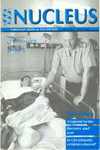The woman had for twelve years been subject to bleeding, presumably uterine and fairly constant. Its effects on her life had been catastrophic.
Physically, she would have suffered chronic anaemia and weakness. Probably she had been unable to conceive and was therefore childless, a significant shame in her society. But the other effects were perhaps worse. We read in Leviticus 15:25-27 that anything she lay or sat on would become unclean, as would any person who touched her. Had she been married her husband may well have divorced her. Furthermore, she would have been unable to participate in the temple activities, to bring her offerings and confess her sins to the priest. This must have led to terrible isolation and loneliness that only compounded her physical problems. It also explains her trembling and fear when discovered by Jesus (Mk 5:33). What shame she must have felt, when the whole crowd knew that she had made Jesus, the famous rabbi, unclean by her touch.
What could have been the medical cause? The chronicity excludes ectopic pregnancy and infection. A slow-growing endometrial adenocarcinoma or benign pelvic tumour are possibilities, as is hormonal imbalance. She had obviously sought long and hard for a cure, as she had spent all she had on doctors, yet grown worse (Mk 5:26). Luke, the physician, interestingly omits this point, presumably out of professional deference to his colleagues.
Jesus’ approach to this woman is exemplary. He heals her physical complaint and with it enables her to re-enter normal society. Not only that, he shows in front of the whole crowd that he is willing to accept her as she is, no matter what the ceremonial implications. No embarrassed avoidance of society’s outcast for him, but a warm welcome to one made in the image of God. We would do well to follow his example and treat our patients as people, whose ailments may have far-reaching implications beyond the merely physical. It will also help us guard against medical arrogance - doctors had done nothing good for this woman, and presumably cast her off with, ‘there’s nothing more we can do’. Yet Jesus showed that by compassion for the patient as a person, we can never exhaust the possibilities of caring.
Differential Diagnosis 35
Mk 7:32-36. Jesus healed a man who was deaf and could hardly talk. What could have been the aetiology?Luke's opinion in the next issue.































